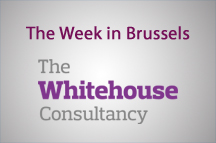 It is the kind of bread-and-butter story Brexiteers are delighted to cite when lambasting “shadowy Brussels”. Two German MEPs from the Culture Committee, selected to lead on legislation on commercial broadcasters and online platforms, are also paid representatives for one of Germany’s public broadcasters. The MEPs had declared this financial interest, but of course concerns over a potential conflict of interest remain. This of course is not at all exclusive to the European Parliament, but who’s counting?
It is the kind of bread-and-butter story Brexiteers are delighted to cite when lambasting “shadowy Brussels”. Two German MEPs from the Culture Committee, selected to lead on legislation on commercial broadcasters and online platforms, are also paid representatives for one of Germany’s public broadcasters. The MEPs had declared this financial interest, but of course concerns over a potential conflict of interest remain. This of course is not at all exclusive to the European Parliament, but who’s counting?
The question of parliamentarians, national no less than European ones, wearing numerous hats, has been an old one. A lot of them come from different professional backgrounds and it is not unusual that they might be involved in regulating their colleagues. But can it be expected that parliamentarians abandon any other professional activity while serving the public? At the end of the parliamentary term, those not re-elected would most likely have to return to their previous occupation, but four or five years away from a profession can make the return extremely difficult. Measures to ban other professional activities could potentially discourage involvement in the political process, depriving parliaments from much needed expertise and narrowing an often already narrow representation of the public.
One suggestion could be that declarations of interest are taken into stronger consideration when appointing rapporteurs and shadow rapporteurs, avoiding giving a leading role to MEPs whose declarations raise concerns over impartiality. This approach would ensure that representatives can retain some other activity, which in many cases could also provide a better link with “the real world” that parliamentarians are elected to represent. At the same time, it will help the European and other parliaments to retain professionals with expertise, who can inject “real-world” experience in the political process.
Science, public health and consumer information
Also this week, the Parliament’s Committee on Environment, Public Health and Food Safety voted to reject health claims that caffeine increases alertness, noting that allowing such claims in the advertising of energy drinks could encourage high sugar consumption among adolescents, as a lot of these drinks contain sugar and adolescents are the largest consumer group.

The vote raised what one might call the “impossible triangle” of science, public health and consumer information. The caffeine and alertness claim had been examined by the European Food Safety Authority which also identified what daily level of caffeine is safe. The science is there. The European Commission then drafted legislation on when the claim can be used, specifically noting that it cannot be used for foods targeting children and including what warning statements should accompany it, ticking off the consumer information element. There is now opposition to the claim on public health grounds, as it is believed to have the potential to inadvertently increase sugar consumption.
Consumer information and protection is a polarising topic, oscillating between the extremes of personal responsibility and banning or heavily regulating something for public health reasons. It is a discussion that has been ongoing for some time and is likely to intensify as overweight, obesity and lifestyle diseases are moving up the list of policy priorities.
The ensuing debate will be interesting – and, from a more commercial point of view – possibly good news for the public affairs industry.














